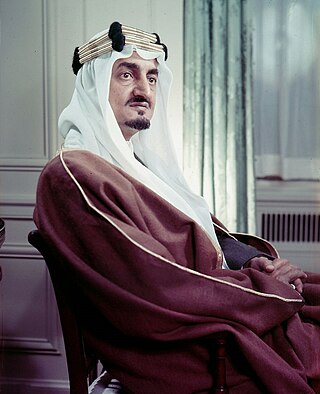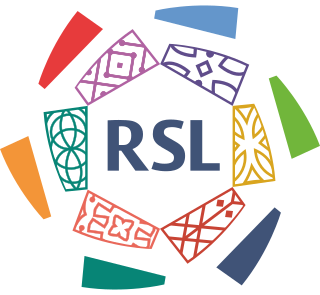Related Research Articles

Mecca is the capital of Mecca Province in the Hejaz region of western Saudi Arabia; it is the holiest city according to Islam. It is 70 km (43 mi) inland from Jeddah on the Red Sea, in a narrow valley 277 m (909 ft) above sea level. Its metropolitan population in 2022 was 2.4 million, making it the third-most populated city in Saudi Arabia after Riyadh and Jeddah. Around 44.5% of the population are Saudi citizens and around 55.5% are Muslim foreigners from other countries. Pilgrims more than triple the population number every year during the Ḥajj pilgrimage, observed in the twelfth Hijri month of Dhūl-Ḥijjah. With over 10.8 million international visitors in 2023, Mecca was one of the ten most visited cities in the world.

The economy of Saudi Arabia is highly reliant on its petroleum sector. Oil accounts on average in recent years for approximately 40% of Saudi GDP and 75% of fiscal revenue, with substantial fluctuations depending on oil prices each year.

Riyadh is the capital and largest city of Saudi Arabia. It is also the capital of the Riyadh Province and the centre of the Riyadh Governorate. Located on the eastern bank of Wadi Hanifa, the current form of the metropolis largely emerged in the 1950s as an offshoot of the 18th century walled town following the dismantling of its defensive fortifications.

Wahhabism is a religious revivalist movement within Sunni Islam named after the 18th-century Hanbali scholar Muhammad ibn 'Abd al-Wahhab. It was initially established in the central Arabian region of Najd and later spread to other parts of the Arabian Peninsula, and is today followed primarily in Saudi Arabia and Qatar.

Abdulaziz bin Abdul Rahman Al Saud, known in the Western world mononymously as Ibn Saud, was an Arab political and religious leader who founded Saudi Arabia – the third Saudi state – and reigned as its first king from 23 September 1932 until his death in 1953. He had ruled parts of the kingdom since 1902, having previously been Emir, Sultan, and King of Nejd, and King of Hejaz.

Faisal bin Abdulaziz Al Saud was the King of Saudi Arabia from 2 November 1964 until his assassination in 1975. Before his ascension, he served as Crown Prince of Saudi Arabia from 9 November 1953 to 2 November 1964, and he was briefly regent to his half-brother King Saud in 1964. He was prime minister from 1954 to 1960 and from 1962 to 1975. Faisal was the third son of King Abdulaziz, the founder of modern Saudi Arabia.

Jeddah, alternatively transliterated as Jedda, Jiddah or Jidda, is the largest city in Makkah Province, Saudi Arabia, and the country's second largest city after Riyadh, located along the Red Sea coast in the Hejaz region. Jeddah is the commercial center of the country. It is not known when Jeddah was founded, but Jeddah's prominence grew in 647 when the Caliph Uthman made it a travel hub serving Muslim travelers going to the holy city of Mecca for Islamic pilgrimage. Since those times, Jeddah has served as the gateway for millions of pilgrims who have arrived in Saudi Arabia, traditionally by sea and recently by air.

Saudi Aramco, officially the Saudi Arabian Oil Company or simply Aramco, is a majority state-owned petroleum and natural gas company that is the national oil company of Saudi Arabia. As of 2024, it is the fourth-largest company in the world by revenue and is headquartered in Dhahran. Saudi Aramco has both the world's second-largest proven crude oil reserves, at more than 270 billion barrels, and largest daily oil production of all oil-producing companies.

Saudi Arabia, officially the Kingdom of Saudi Arabia (KSA), is a country in West Asia. Located in the centre of the Middle East, it is one of the countries situated in the Gulf region. It covers the bulk of the Arabian Peninsula and has a land area of about 2,150,000 km2 (830,000 sq mi), making it the fifth-largest country in Asia, the largest in the Middle East, and the 12th-largest in the world. It is bordered by the Red Sea to the west; Jordan, Iraq, and Kuwait to the north; the Persian Gulf, Bahrain, Qatar and the United Arab Emirates to the east; Oman to the southeast; and Yemen to the south. The Gulf of Aqaba in the northwest separates Saudi Arabia from Egypt and Israel. Saudi Arabia is the only country with a coastline along both the Red Sea and the Persian Gulf, and most of its terrain consists of arid desert, lowland, steppe, and mountains. The capital and largest city is Riyadh; other major cities include Jeddah and the two holiest cities in Islam, Mecca and Medina. With a population of almost 32.2 million, Saudi Arabia is the fourth most populous country in the Arab world.

The House of Al Saud is the ruling royal family of Saudi Arabia. It is composed of the descendants of Muhammad bin Saud, founder of the Emirate of Diriyah, known as the First Saudi State, (1727–1818), and his brothers, though the ruling faction of the family is primarily led by the descendants of Ibn Saud, the modern founder of Saudi Arabia. It forms a subtribe of the larger prominent ancient Banu Hanifa tribe of Arabia, from which well known 7th century Arabian theologist Maslama ibn Ḥabīb originates. The most influential position of the royal family is the King of Saudi Arabia, an absolute monarch. The family in total is estimated to comprise 15,000 members; however, the majority of power, influence and wealth is possessed by a group of about 2,000 of them. Some estimates of the royal family's wealth measure their net worth at $1.4 trillion. This figure includes the market capitalization of Saudi Aramco, the state oil and gas company, and its vast assets in fossil fuel reserves, making them the wealthiest family in the world and the wealthiest in recorded history.

The Saudi Arabia national football team (SAFF) represents Saudi Arabia in men's international football. They are known as Al-Suqour Al-Arabiyyah and sometimes Al-Suqour Al-Khodhur, a reference to their traditional colours of green and white, and represent both FIFA and the Asian Football Confederation (AFC).

Salman bin Abdulaziz Al Saud is King of Saudi Arabia, reigning since 2015, and was also Prime Minister of Saudi Arabia from 2015 to 2022. The 25th son of King Abdulaziz, the founder of Saudi Arabia, he assumed the throne on 23 January 2015. Prior to his accession, he was Crown Prince of Saudi Arabia from 18 June 2012 to 23 January 2015. Salman is the third oldest living head of state, the oldest living monarch, and Saudi Arabia's first head of state born after the unification of Saudi Arabia. He has a reported personal wealth of at least $18 billion, which makes him the third wealthiest royal in the world.

The Saudi Pro League (SPL), known as the Roshn Saudi League (RSL) for sponsorship reasons, is the highest division of association football in the Saudi league system.

Abdullah bin Abdulaziz Al Saud was King and Prime Minister of Saudi Arabia from 1 August 2005 until his death in 2015. Prior to his accession, he was Crown Prince of Saudi Arabia since 13 June 1982. He was the tenth son of King Abdulaziz, the founder of Saudi Arabia.

Hajj is an annual Islamic pilgrimage to Mecca, Saudi Arabia, the holiest city for Muslims. Hajj is a mandatory religious duty for capable Muslims that must be carried out at least once in their lifetime by all adult Muslims who are physically and financially capable of undertaking the journey, and of supporting their family during their absence from home.

The king of Saudi Arabia, officially the King of the Kingdom of Saudi Arabia, is the head of state and head of government of the Kingdom of Saudi Arabia who holds absolute power. He is the head of the Saudi Arabian royal family, the House of Saud. The king is the commander-in-chief of the Saudi Arabian Armed Forces and the head of the Saudi national honors system. The king is called the "Custodian of the Two Holy Mosques", a title that signifies Saudi Arabia's jurisdiction over the mosques of Masjid al-Haram in Mecca and Al-Masjid an-Nabawi in Medina. The title has been used many times through the history of Islam. The first Saudi king to use the title was Faisal; however, King Khalid did not use the title after him. In 1986, King Fahd replaced "His Majesty" with the title of Custodian of the Two Holy Mosques, and it has been since used by both King Abdullah and King Salman. The king has been named the most powerful and influential Muslim and Arab leader in the world according to the Muslim 500.

Mohammed bin Salman Al Saud, commonly known by his initials as MBS or MbS, is the de facto ruler of the Kingdom of Saudi Arabia, formally serving as Crown Prince and Prime Minister. He is the heir apparent to the Saudi throne, the seventh son of King Salman of Saudi Arabia, and the grandson of the nation's founder, King Abdulaziz.

The Yemeni civil war is an ongoing multilateral civil war that began in late 2014 mainly between the Rashad al-Alimi-led Presidential Leadership Council and the Mahdi al-Mashat-led Supreme Political Council, along with their supporters and allies. Both claim to constitute the official government of Yemen.

On 26 March 2015, Saudi Arabia, leading a coalition of nine countries from West Asia and North Africa, launched a military intervention in Yemen at the request of Yemeni president Abdrabbuh Mansur Hadi, who had been ousted from the capital, Sanaa, in September 2014 by Houthi insurgents during the Yemeni Civil War. Efforts by the United Nations to facilitate a power sharing arrangement under a new transitional government collapsed, leading to escalating conflict between government forces, Houthi rebels, and other armed groups, which culminated in Hadi fleeing to Saudi Arabia shortly before it began military operations in the country.

Iran and Saudi Arabia are engaged in a proxy conflict over influence in the Middle East and other regions of the Muslim world. The two countries have provided varying degrees of support to opposing sides in nearby conflicts, including the civil wars in Syria and Yemen; and disputes in Bahrain, Lebanon, Qatar, and Iraq. The struggle also extends to disputes or broader competition in other countries globally including in West, North and East Africa, South, Central, Southeast Asia, the Balkans, and the Caucasus.